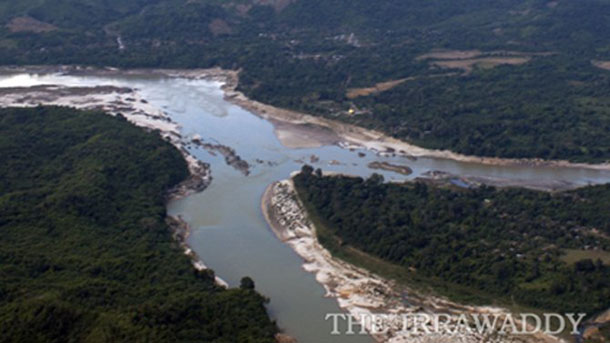MANDALAY — Ethnic politicians from Burma have warned the Chinese government that resumption of the Myitsone dam project will harm relations between the two countries, as President Thein Sein travels to Beijing on Friday.
A delegation of ethnic politicians from the Arakan National Party (ANP) and the National Democratic Force (NDF) visited China early last week at the invitation of Chinese leaders to discuss Burmese minority affairs.
“An official from the Chinese Foreign Department hinted during the welcome address that resuming the Myitsone Dam project would strengthen relations between the two countries. We think that is ridiculous and warned them that the project would harm ties,” Bawk Ja, chairperson of the NDF chapter in Kachin State, where the dam project is located, told The Irrawaddy.
She said the Chinese officials did not respond to the delegation’s concerns about the Chinese-backed dam project on the Irrawaddy River. Instead, she said they told the delegation about another dam project on the Mekong River which they claimed had benefited local residents.
“Even though we offered a long explanation about the importance of the Irrawaddy River to Burma, it seems they wanted to convince us to agree with the Myitsone Project,” she said.
Asked about minority affairs in Burma, the ethnic Arakan and Kachin politicians told the Chinese officials that they worried about the consequences of Chinese-backed projects in Arakan and Kachin states.
“The Arakan leaders said they were concerned for people who live where the Shwe gas pipeline passes through to China,” Bawk Ja said.
She said she expected Thein Sein to discuss Myitsone during his visit to Beijing this weekend.
“They will talk about the dam, for sure,” she said. “However, we want the president to not only look at how the government will benefit, but to also think about the people, the country and the future of our environment. The Chinese government should think about our country’s well-being if they really want to strengthen ties.”
Since a quasi-civilian government came to power in Burma about three years ago, Chinese leaders have frequently extended invitations to Burmese political parties, including the country’s biggest opposition party, the National League for Democracy (NLD). Activists from the 88 Generation Peace and Open Society have also traveled there to meet with the leadership.
Thein Sein is currently making his third state visit to China. He is expected to meet for bilateral talks with Chinese President Xi Jinping.
The Myitsone dam has complicated China-Burma relations since 2011, when Thein Sein suspended the multi-billion-dollar project due to public protests. Anti-dam protesters said the project would have detrimental effects on their environment and livelihoods.
But villages have still been relocated to make way for the project, and China has been steadily pushing for a resumption of operations. The state-owned China Power Investment Corporation (CPI), which is backing the project along with the Burmese government, hopes that they will have an opportunity to restart the project after Thein Sein’s term ends in 2015.
“We do not want suspension, but a complete termination of the dam project, which will seriously affect the river. If the Irrawaddy is affected, the delta—the region which provides most of the country’s rice—will die as well,” said Tin Thit, an environmental activist based in Mandalay.
“We would like to urge President Thein Sein, Chinese government and the CPI company to think about the future environmental destruction, and not to go against the desires of the people of Burma,” he added.
















